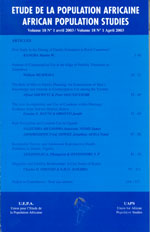
|
African Population Studies
Union for African Population Studies
ISSN: 0850-5780
Vol. 19, No. 2, 2004, pp. 139-157
|
 Bioline Code: ep04016
Bioline Code: ep04016
Full paper language: English
Document type: Research Article
Document available free of charge
|
|
|
African Population Studies, Vol. 19, No. 2, 2004, pp. 139-157
| en |
Effects of Women's Schooling on Contraceptive Use and Fertility in Tanzania
Ayoub, Ayoub S.
Abstract
This study explores the economic relationships between women's schooling, fertility rates, and contraceptive use in Tanzania where population growth and fertility rates are among the highest in the world and aggravate the already ailing economy. Two models are used: fertility and contraceptive use. This study covers women ages 15 to 49. Drawing on 1996 data from the Demographic and Health Surveys (DHS), the study finds that women's schooling and other socioeconomic variables are important in explaining reproductive behavior. The fertility model indicates that higher education levels are consistently associated with lower fertility rates. Likewise, the contraceptive use model indicates that more education is positively associated with contraceptive use. Both models show that the relations become stronger with higher levels of schooling. The findings indicate that raising women's education levels improves their economic opportunities, increasing the value of their time and, in turn reducing their desire for large families.
|
| |
© Copyright 2004 - Union for African Population Studies
Alternative site location: http://www.uaps-uepa.org
|
|
